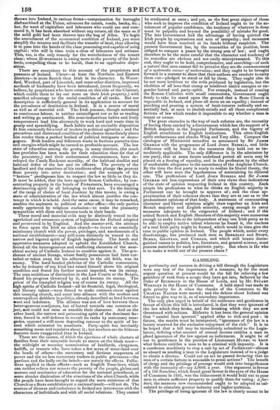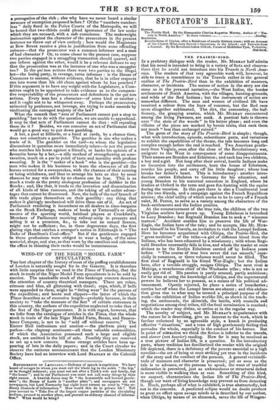GAMBLING.
Er pertinacity and success in driving a bill through the Legislature were any test of the importance of a measure, by far the most urgent question at present would be the bill for relieving a feW gamblers of rank from a scrape they have got into, fathered by the Duke of RICHMOND in the House of Lords, and by Mr. STUART WORTLEY in the House of Commons. A bold stand was made to gain priority for it when the thanks of the Commons to Sir CHARLES NAPIER were moved; and the debate about Ireland was forced to give way to it, as of secondary importance. The only plea urged in behalf of the noblemen and gentlemen in favour of whom this bill is introduced, is that they were ignorant of the law which they broke, and for breaking which they are now threatened with actions. Hitherto it has been the general opinion that " nemini licet ignorari" applied alike to rich and poor : in future, the maxim tnust be interpreted, "ignorance of the law is a luxury reserved for the exclusive enjoyment of the rich." It is to be hoped that a bill may be immediately submitted to the Legis- lature, defining what amount of annual income entitles a man to plead ignorance of the law against an indictment. It might be of use to gentlemen in the position of Lieutenant Muria° to know what fortune entitles a man to be a criminal with impunity. It is a cumbrous machinery to stop a suit by act of Parliament—almost as absurd as sending a man to the Legislature instead of to a judge to obtain a divorce. Could not an act be passed declaring that no man of a certain fortune is amenable to penal actions ? The benefit of clergy and the privilege of peerage would sink into insignificance with the immunity of—say 5,000/. a year. One argument in favour of a 101. franchise, which found great favour in the eyes of the House of Commons in 1831, was the inducement it would bold out to poor men to obtain sufficient property to qualify them for voting : for- tiori, the measure now recommended ought to be adopted as cal- culated to stimulate greater industry and higher ambition.
The privilege of being ignorant of the law is clearly meant to be a prerogative of the rich ; else why have we never heard a similar measure of exemption proposed before ? Ofthe "numbers number- less" daily fined in the Police Courts of the Metropolis, we will be bound that two-thirds could plead ignorance of the law under which they are accused, with a safe conscience. The makeweight insinuation against the character of the prosecutors in the present instance we throw out of view entirely : how would the Magistrate at Bow Street receive a plea in justification from some offending cabman—that the prosecutor was a common informer and a man of bad character ? Or, to come closer to the present case, suppose two parties engaged in a smuggling transaction should quarrel, and One inform against the other, would it be a relevant defence to say that the prosecution was at the instance of one who was a smuggler too? In the qui tam actions there were two parties to the illegal bet—the losing party, in revenge, turns informer : is the House of Commons to assume, without evidence, that he is in other respects one iota worse than his old chum against whom he has peached ? If this argument is to have any weight with the Legislature, a Com- mittee ought to be appointed to take evidence as to the compara- tive respectability of the prosecutors and defendants in the qui tam actions. Every man has a character—of some kind or another ; and it ought not to be whispered away. Perhaps the prosecutors, animated by penitence, not revenge, are trying to make amends by vindicating the outraged majesty of the law?
What the remark that "acts of Parliament cannot put a stop to gambling" has to do with the question, we are unable to apprehend. It may be that acts of Parliament cannot do that : will repealing them do it ? Besides, we can conceive an act of Parliament that would go a good way to put down gambling.
A bet, a pool at billiards, or a hand at cards, by a chance time, does not constitute a gambler. The gambler is one who makes a trade of it. The gambler on the turf—to whom the legislative discussions in question more immediately relate—is not the person 'who matches his horse against a friend's, or backs his opinion of a tavourite horse by a bet,—a silly method of strengthening an asse- veration, much on a par in point of taste and morality with profane Swearing. It is the "maker of a book" who is the gambler—the man who makes it his business to learn the character of all the horses entered for a sweepstakes, with the chances of their running or being withdrawn, and thus to arrange his bets so that by some Chances he may win while by no chance can he lose. This is as Much a trade as the pretty analogous profession of dabbler in the Stocks ; and, like that, it tends to the invention and dissemination Of all kinds of false rumours, and the taking of all unfair advan- tages that cannot be discovered. Now, the bulk of the turf branch of this trade pique themselves on their gentility : any thing that makes it glaringly mechanical will drive them out of it. An act of Parliament rendering it incumbent on all dealers in time-bargains on the Stock Exchange, makers of books at Tattersall's or other resorts of the sporting world, habitual players at Crockford's, Members of Parliament receiving railway-scrip in presents and telling it at a premium, &c., to take out an annual licence, Might not be sufficient ; for, in these degenerate days, the first glaring sign that catches a stranger's notice in Edinburgh is "The Duke of Hamilton's Coal-office." But if the gentlemen engaged in these professions were obliged to wear a badge, of the same material, shape, and size, as that worn by the omnibus and cab-men, the effect in thinning their ranks would be instantaneous.



























 Previous page
Previous page